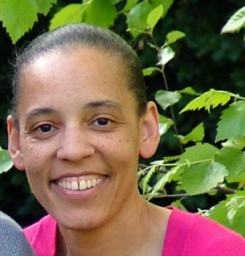The Association of Hospitals and Institution Libraries defined bibliotherapy as “the use of selected reading materials as therapeutic adjuvants in medicine and psychiatry; also guidance in the solution of personal problems through directed reading.” In this blog post, Marna Clowney-Robinson, a Clinical Social Worker and the Graduate Student Experience Librarian at the University of Michigan, will discuss the importance of bibliotherapy and how libraries can support this vital work.
Jamia: How did you begin to practice bibliotherapy?
Marna: My training in bibliotherapy enables me to use books, primarily young adult novels and graphic medicine, as adjuncts to traditional modalities. When I work with patients in bibliotherapy, one method that I use begins with choosing the book or graphic medicine novel to use within the therapeutic session and providing a composition notebook that contains questions relating to the text. The books are all chosen for each person individually based on the book’s theme, content, and characters. The patient is given a selection or a chapter or passage to read, and they need to answer questions that I’ve come up with as a guide to each book. So I have to read every book before I assign readings from it. Once they are at home working on those questions and doing the reading, they come back into session, and then we talk it through. I’ve seen patients come from a place where they are very hesitant to verbalize their emotions, connect with the character in a book or within that graphic medicine novel, and share their own struggles. It has been about five years since I started using bibliotherapy to treat patients who struggle with mental health issues.
Jamia: How can libraries support bibliotherapy?
Marna: The library can be an excellent resource for therapists, community group leaders, and teachers. With the aid of books, libraries can equip their communities with tools to better understand their feelings and actions. The library can help groups organize book clubs and provide the space and materials they need to hold events related to mental health and other issues affecting their communities. Bibliotherapy can be an effective tool for connecting students with reading and writing skills in the classroom.
Jamia: What successful programs are out there that libraries can reference?
Marna: There are numerous books and materials written about bibliotherapy that are great resources. The American Library Association lists available resources to organizations, libraries, and the public on bibliotherapy. An organization that provides training on and in bibliotherapy is the International Federation for Biblio/Poetry Therapy.
Resources suggested by Marna:
During the Fall of 2021, Dr. Nicole Cooke, the Augusta Baker Endowed Chair at the University of South Carolina, hosted the series #CriticalConversationsInLIS. If you want to learn more, watch this webinar: Let’s Talk About Trauma Informed Librarianship and Bibliotherapy and with Marna Clowney-Robinson.
 Biography:
Biography:
Marna M. Clowney-Robinson, LLMSW, MLIS, is a clinical social worker and the Graduate Student Experience Librarian at the University of Michigan. She has recently completed a certificate program in Interprofessional Informatics at Simmons University. She earned Master’s degrees in Library and Information Science from Wayne State University and Social Work from the University of Michigan. At the intersection of social work and librarianship, she has utilized bibliotherapy and graphic medicine to treat mental health issues with specializations in eating disorders and identity issues.
See also:



